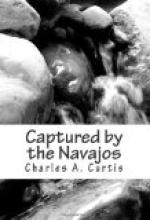As I reached the border of the plantation I found between me and the road, which here entered the town, a cactus hedge about five feet high, with no passage through it except at a considerable distance to the right. The agent veered away to the opening, but Corporal Frank kept Sancho close behind me, and I gave my good thoroughbred his head and rode sharply at the hedge, cleared it at a bound, receiving but a few scratches from the cactus spines. Turning my head as I came into the road, I saw Frank come through like a trooper and join me.
Clear of the hedge, I found myself at the foot of a narrow street which passed between two tall adobe buildings and entered the plaza near the centre of its western side. I took it at a run, and when half-way through saw directly before its inner end, facing the north, a group of old, gray-haired Navajos standing alone with their arms folded, and holding their blankets firmly about their breasts, while in their immediate front were some one hundred mounted Indians, painted and ornamented in true aboriginal warrior style.
On the terraced fronts of the houses and their flat roofs, and along the three sides of the square, seemed to be gathered the entire population of the town, looking passively on.
Before I had more than taken in the situation, a rattling discharge of rifles came from the direction of the Dominicans, and the old men fell in a heap to the ground. Covered with dust and mud, our horses reeking with foam, Corporal Frank and I burst through the crowd of spectators on the west side of the plaza, and gained the open space just as the firing-party was advancing with gleaming knives and wild yells to complete the tragedy by scalping the slain.
Raising my right hand I shouted, in Spanish, “Stop where you are!”
Frank had unslung his carbine and was holding it by the small of the stock in his right hand, the barrel resting in his left, looking calmly and resolutely at the hesitating Indians. The blood of three generations of soldierly ancestors was thrilling his veins with a resolution to act well in any emergency which might arise.
The Pueblos halted, and at the same moment a group of eighteen women and nearly three times as many children, some of them in arms, who had been reserved—as I afterwards learned—for later shooting, ran into the space and clung to my feet, stirrups, and the mane and tail of my horse, entreating with eyes and voices for protection.
The war-cries had ceased and the Dominicans had gathered in an angry and gesticulating group, when Sergeant Cunningham and the rest of the men appeared on foot, running into the plaza from a side street, and formed in line before us.
The massacre ended with the death of the old men. Aided by the agent and the Catholic priest of the pueblo I succeeded in impressing upon the Jemez warriors that they must discountenance any further hostile demonstrations of the Santo Dominicans, and told the latter that unless they promptly withdrew and departed for their own reservation I should punish them for their recent conduct. They at once sullenly departed.




